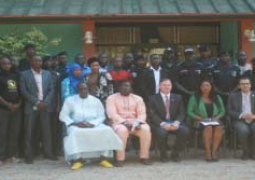The
United Kingdom has officially delivered a frank, forthright and candid
statement on The Gambia at the 34th Universal Periodic Review (UPR),
categorically addressing the progress made so far by the country. It also noted
the expectation of a future democratic and stable nation. However, serious and
staid concerns are also raised.
In its UPR statement, forwarded to The Point,
the U.K. government commended The Gambia on the ‘‘progress made to address the
past violations through the Truth, Reconciliation and Reparations Commission
(TRRC), and the drafting of a new Constitution.’’
Furthermore, Britain noted that it welcomes
‘‘The Gambia’s engagement with the UPR’’ and stressed that this was a pivotal
time in the country.
The British government that has always been
instrumental in the battle to support the country in its political and economic
challenges through various fronts also hopes for a stable and thriving nation.
According the statement, the U.K. expects that
following the progress made to address past violations through the TRRC and the
drafting of a new a constitution will “embed human rights in the future of a
democratic and stable Gambia.’’
Despite the progress made, Britain also
expressed concern that ‘‘violence against women remains a serious problem in
the country.’’
It
also outlined that laws that continue to repress freedom of the press and
journalists are also a concern.
The
British government also noted that ‘‘women and minority groups continue to face
discrimination.’’
Most
significantly, the statement further revealed that corruption is also seriously
a concern, causing many human rights issues and undermining democracy.
The
U.K. thus urged The Gambia government to respect the rights to peaceful
assembly and association and further outlined few recommendations.
Even
though the British government strongly reaffirmed its support to the government
and people of The Gambia, it humbly and respectfully recommended ‘‘protecting
the right to freedom of expression by repealing the Sedition Act and Official
Secret Act.”
Also,
the U.K. recommended to ‘‘set out publicly, steps the government will take to
ensure women’s full participation and leadership in public life.’’
Effective
implementation of anti-trafficking legislation is also recommended by the
British government. It includes the timely and just prosecution of perpetrators
of human trafficking.
It is true that despite the commendations and
concerns, several unresolved grievances are reported elsewhere.
This correspondent who recently wrote an
open-letter to the Attorney General and Minister of Justice as well as the
Director General of the SIS, decrying the inhuman and degrading treatment
against him by the defunct National Intelligent Agency (NIA) officers also
hears similar worries.
The official complaints made that perpetrators
who unlawfully incarcerated and brutally tortured him severally while working
as a journalist in the country and are still operating freely are also
described as ‘apprehensive.’
However, The Point has learnt that “diplomatic
and other channels will be used to convey and raise such concerns to the
government for urgent consideration as would be necessary.’’




